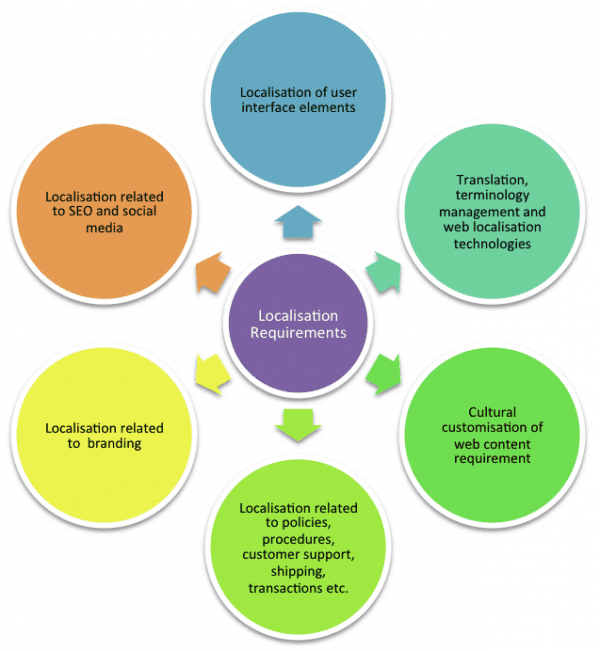Localisation – much more than just translation
In the previous post in this series, I looked at the opportunities for growth from international markets. Now that you have identified that you want to expand internationally, you’ve got your budget approved, but what about all that web and printed content that you now need to translate? Well, the good news is that you are not ready to think about translating anything just yet. Before you do so, you will need to consult with other stakeholders in the business and where possible, existing and potential customers to identify what your strategic objectives are.
There are a lot of issues to consider that need to go into your plan:

Localisation project activities
High-level questions you should collectively be asking yourselves at this stage include:
- What are our competitors doing and to whom are they selling? - if your competitors are there it may be prudent to follow their lead.
- Which markets are similar to our domestic market in terms of customer demographic and culture? - at this stage, the less you have to reinvent the wheel the better.
- What does success look like and how will it be measured? - tricky question but finding a way to demonstrate ROI is critical to the long-term success and investment in your program.
- How might we need to adjust our offering to meet the demands of those markets? - not all of your products/services are necessarily of interest in other markets so take the time to research and see if you find any obvious gaps or saturation points.
- What are the legal and tax implications of trading in your new market? - do your homework and ensure that trading in another country is commercially viable for your organisation
- What are the practical considerations to trading in that market? - think multilingual telephone or email support, banking protocols and conventions, currencies, SEO etc.
- What are our priorities? - most successful localisation programs adopt a phased approach to roll-out which serves to mitigate risk, effort and cost in the early stages. You may consider launching one new language at a time, limiting content localisation only to web-based and business-critical content or focusing only on certain products/services.
What will make or break your web localisation project?
To summarise, what I've seen on projects here are the six key success factors to...
Make
1. Clearly outline how localisation will impact overall company revenues
2. Demonstrate how it fits into the overall business strategy
3. Show how it positively impacts the customer experience
4. Demonstrate how it enhances productivity and other value-creating activities
5. Illustrate how it is a cost effective way to reach your global audience
6. Elevate its importance as a global branding tool
Break
1. Embark on a localisation program without consulting internal stakeholders and customers
2. Omit the research phase which will help you to prioritise your objectives
3. Fall into the trap of thinking that stand alone translation is all you need to consider
4. Begin until you have decided on mechanics for evaluating and demonstrating success
5. Endeavour to do all your localisation in-house without seeking expert advice
6. Select a partner without a clearly defined evaluation criteria that fits your needs
Market research companies can make a real difference in the process of defining the key parameters for your localisation strategy but where the budget does not allow for this, there is still a lot of scope for you to initiate some research of your own. Remember, in order for your venture to succeed, you need to be certain that your new audience will relate and buy-in to your brand, products/services and values.
TIP: The most common and gravest mistake organisations make is falling into the trap of thinking that translating some content is all it takes to succeed in a new market.
In the final post in the series, I'll look at your options for managing and outsourcing a localisation project.

Thanks to
Karin Nielsen for sharing their advice and opinions in this post. Karin Nielsen is Commercial Director at
Codex Global Translation Services. She has 7 years’ experience in localisation solutions and technology and was previously on the board of a global top 10 language services company as EU Sales Director. You can connect with Karin on
LinkedIn.



 Thanks to
Thanks to 


